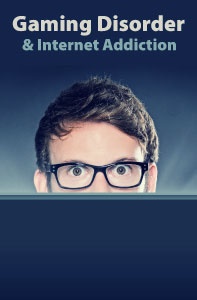We are launching our new website logins, account creation, and purchases are restricted. Any course activity is not being recorded until the new site has launched. Expected Launch Time 8:00pm EST Nov 20th.
$14

Related Courses

Schizophrenia: Understanding & Treating

Poise: The Psychology of Posture

Psychological Effects of Media Exposure
Gaming Disorder and Internet Addiction
Louis R. Franzini, PhD
CE Credit: 1 Hour
Target Audience: Psychology CE | Counseling CE | Social Work CE | Occupational Therapy CEUs | Marriage & Family Therapy CE | School Psychology CE | Teaching CE
Learning Level: Introductory
Course Abstract
Gaming Disorder and Internet Addiction is a 1-hour online continuing education (CE) course that examines the controversial mental health condition of gaming disorder, and the broader concept of internet addiction.
Parents, educators, and health care professionals have all expressed concerns about the proliferation of electronic devices and their negative effects throughout our society. Professional organizations have moved toward considering that the overuse of such devices may be diagnosable mental disorders. These actions have raised a number of related legitimate and controversial issues, which professionals, parents, and societal leaders must address. This course will review the latest developments in this area and some of the pros and cons of those issues.
Gaming disorder itself may be regarded as a subarea of the broader concept of internet addiction. Some of the topics addressed in this course include Process and Problems of Approval of New Disorders, Scientific Issues of Reliability and Validity in the DSM, Does Playing Violent Video Games Cause Violent Behavior, and Substance-Related Addictions.
Course #11-31 | 2020 | 22 pages | 10 posttest questions
Learning Objectives
Professional Development Resources, #1046, is approved as an ACE provider to offer social work continuing education by the Association of Social Work Boards (ASWB) Approved Continuing Education (ACE) program. Regulatory boards are the final authority on courses accepted for continuing education credit. ACE provider approval period: 6/12/2022 - 6/12/2025. Social workers completing this course receive 1 clinical continuing education credits.
Professional Development Resources is CE Broker compliant (#50-1635 - all courses are reported within two business days of completion). Professional Development Resources, Inc. is recognized by the New York State Education Department's State Board for Social Work as an approved provider of continuing education for licensed social workers (#SW-0664 - Note: New York social workers will receive 1 continuing education credit(s) for completing this self-study course). Professional Development Resources is also approved by the Texas State Board of Social Worker Examiners (#5678).
This online course provides instant access to the course materials (PDF download) and CE test. The course is text-based (reading) and the CE test is open-book (you can print the test to mark your answers on it while reading the course document).
Successful completion of this course involves passing an online test (80% required, 3 chances to take) and we ask that you also complete a brief course evaluation. Click here to learn more.
Have a question? Contact us. We’re here to help!
Louis R. Franzini, PhD, received his B.S. degree in Psychology from the University of Pittsburgh, his M.A. degree in Clinical Psychology at the University of Toledo, and his Ph.D. in Clinical Psychology from the University of Pittsburgh. He then completed a Postdoctoral Fellowship in Behavior Modification at the State University of New York at Stony Brook (now Stony Brook University). Following the postdoctoral program Dr. Franzini joined the Psychology Department at San Diego State University, where he spent his entire academic career. He retired as Emeritus Professor of Psychology. His international academic experience included appointments as Distinguished Professor of Psychology at the Universite Catholique de Louvain, Louvain-le-Neuve, Belgium and Senior Fellow in the School of Accountancy and Business, Human Resource and Quality Management Division at Nanyang Technological University, Singapore. Dr. Franzini is licensed as a psychologist in Florida and in California.
Financial: Dr. Franzini receives royalties on his books from John Wiley & Sons, Rowman and Littlefield, Square One Publishers, Sage Publications and from Professional Development Resources on sales of his courses.
Nonfinancial: No relevant nonfinancial relationship exists.
Customer Reviews